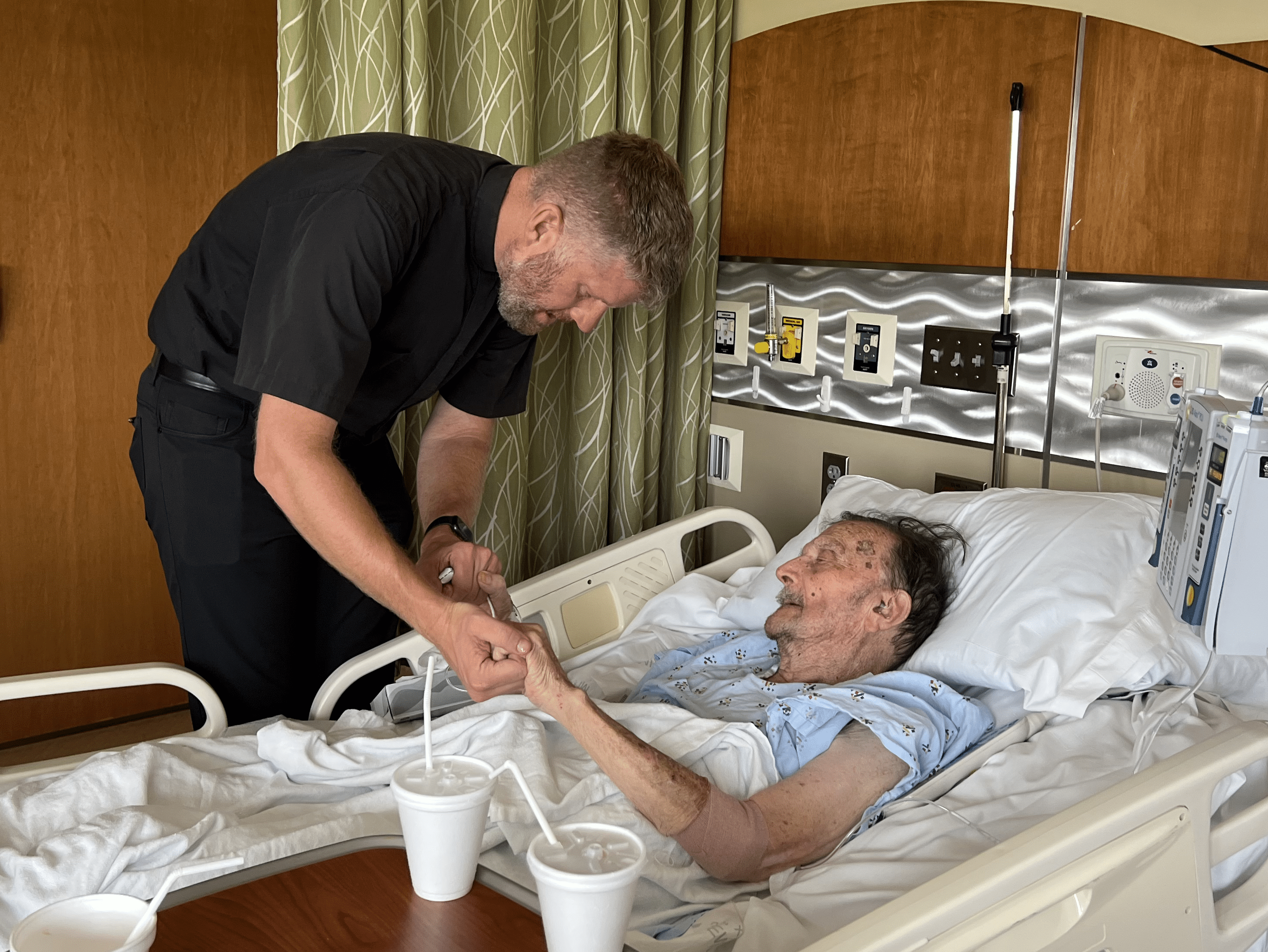
Father Andrew Sohm administers the Sacrament of the Anointing of the Sick and imparts the Apostolic Pardon on Bob Pleiss. AMY WEINDEL/STAFF
Living Mercy
‘The Sacraments do all the work:’ Caring for the elderly, the sick and the dying
August 30, 2024
Roberta Pleiss was sitting with her husband, Bob, in his hospital room last month, wondering what to do next. A few days before, Bob was admitted to the hospital with a severe infection that required strong antibiotics. Doctors told her he would need to be transferred to a care center to continue recovering.
Pleiss was feeling overwhelmed and distraught when there was a knock on the door. It was Father Andrew Sohm.
“He was a ray of sunshine when he came through that door,” Pleiss said. “I had just found out that our choices for a care center to finish his treatment were very limited. I was really, really discouraged.”
Father Sohm told Pleiss that while her husband’s physical health was important, he was there to attend to something much more important – his spiritual health.
“I wish I remembered his exact words because they were what carried me through,” she said.
Often described by his family as “the Energizer Bunny” because of his ability to bounce back from health setbacks, since 2000, Bob had survived a heart attack, a stroke, swallowing issues that necessitated a feeding tube and more. Despite these challenges, Pleiss said her husband always had a strong will to live that stemmed from his devotion to his family and his Catholic faith.
He had his rosary with him at all times, and no matter what he was going through healthwise, he would do his best to attend Mass on Saturday nights at their parish, Mary Our Queen in Omaha.
“He loved Holy Communion,” Pleiss said. “No matter how weak he felt during Mass, he always walked up to receive it.”
THE APOSTOLIC PARDON
Father Sohm handles sick calls for Saint Stephen the Martyr and Saint Wenceslaus parishes in Omaha and Saint Patrick Parish in Elkhorn. He visits hospitals and nursing homes within those parishes’ boundaries and visits retirement communities, nursing homes and rehabilitation centers, as well. His favorite part of being a hospital chaplain is administering the Apostolic Pardon.
The Apostolic Pardon is a blessing with an indulgence that happens after the Anointing of the Sick if the recipient is in danger of death. While Confession forgives the eternal punishment for sin, the indulgence attached to the Apostolic Pardon forgives temporal punishment due to sin.
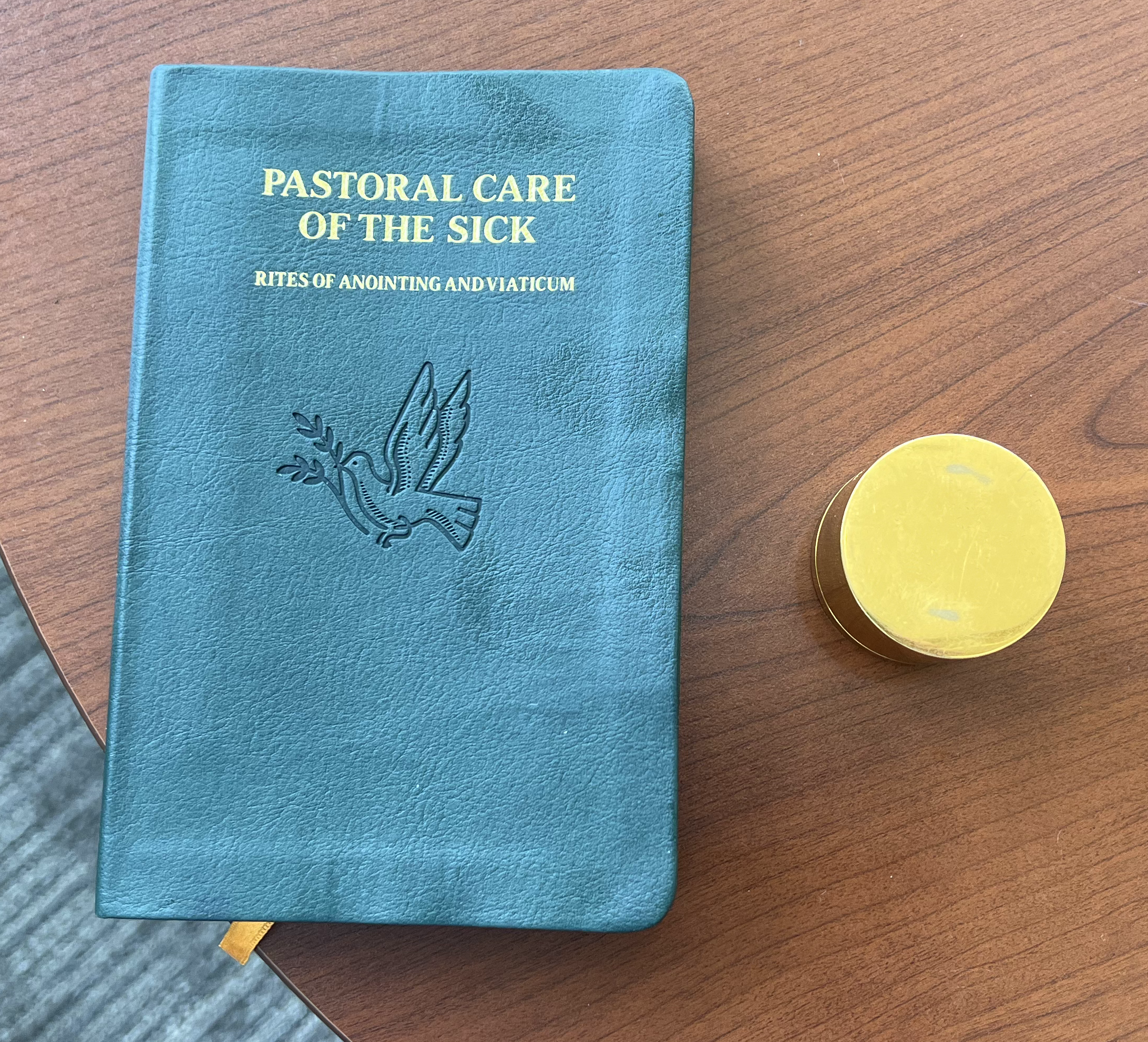
When visiting the sick and the dying, Father Andrew Sohm brings his Pastoral Care of the Sick: Rites of Anointing and Viaticum prayer book and the sacred “Oil of the Sick,” which offers the sick a remedy for infirmity of body and soul. AMY WEINDEL/STAFF
“It’s such a gift and such a grace to know that their soul is being cleansed and washed and renewed and is just as white as a sheet on the bed and prepared for the Lord,” Father Sohm said.
Father Sohm said that having a family gathered around when their loved one receives the Anointing of the Sick and the Apostolic Pardon is especially beautiful.
“There might be kids around their mom who is lying there, and I tell them, ‘just like your mom always got you ready for church – and wanted you to look beautiful – now we’re getting your mother beautiful and ready to meet the Lord,’ and I see the joy and the great consolation it brings to the grieving,” he said.
Father Sohm said what happens when he – or any priest – administers the sacraments at the bedside of the dying often has a life-changing impact on the living.
He has received calls from the relatives of the dying – sometimes weeks later – telling him how grateful they were for his presence. In some cases, they tell him it has moved them to come back to the Church or, if they are not Catholic, to learn more about it.
One young man who had been away from the Church told Father Sohm that being in the room when his mother received the sacraments was exactly what he needed to return to the Church.
Father Sohm said it can be tempting to ask questions of those at the bedside when you know the wheels are turning, but in that moment, it is better to “kind of step back, right? Let the sacraments do all the work. That is where the power is; you have the words of the Lord. That’s definitely the most gratifying and beautiful thing about the work we get to do.”
THE HUMANITY OF THE SICK AND THE DYING
Across northeast Nebraska each year, thousands of homebound Catholics or those in nursing homes, retirement centers and hospitals receive the sacraments and have Holy Communion brought to them by priests, deacons, religious sisters and EMHCs (Extraordinary Ministers of Holy Communion).
Growing up, Deacon George Butterfield had never spent time with sick or dying people, so the prospect of doing so made him uneasy. His perspective changed when he volunteered at a retirement center in college. There, he witnessed the residents’ humanity and realized how much they had to offer.
Today, as the director of pastoral care at New Cassel Retirement Center in Omaha and a staff chaplain at University of Nebraska Medical Center, Deacon Butterfield treasures his time with the elderly, soaking in their joy and faithfulness.
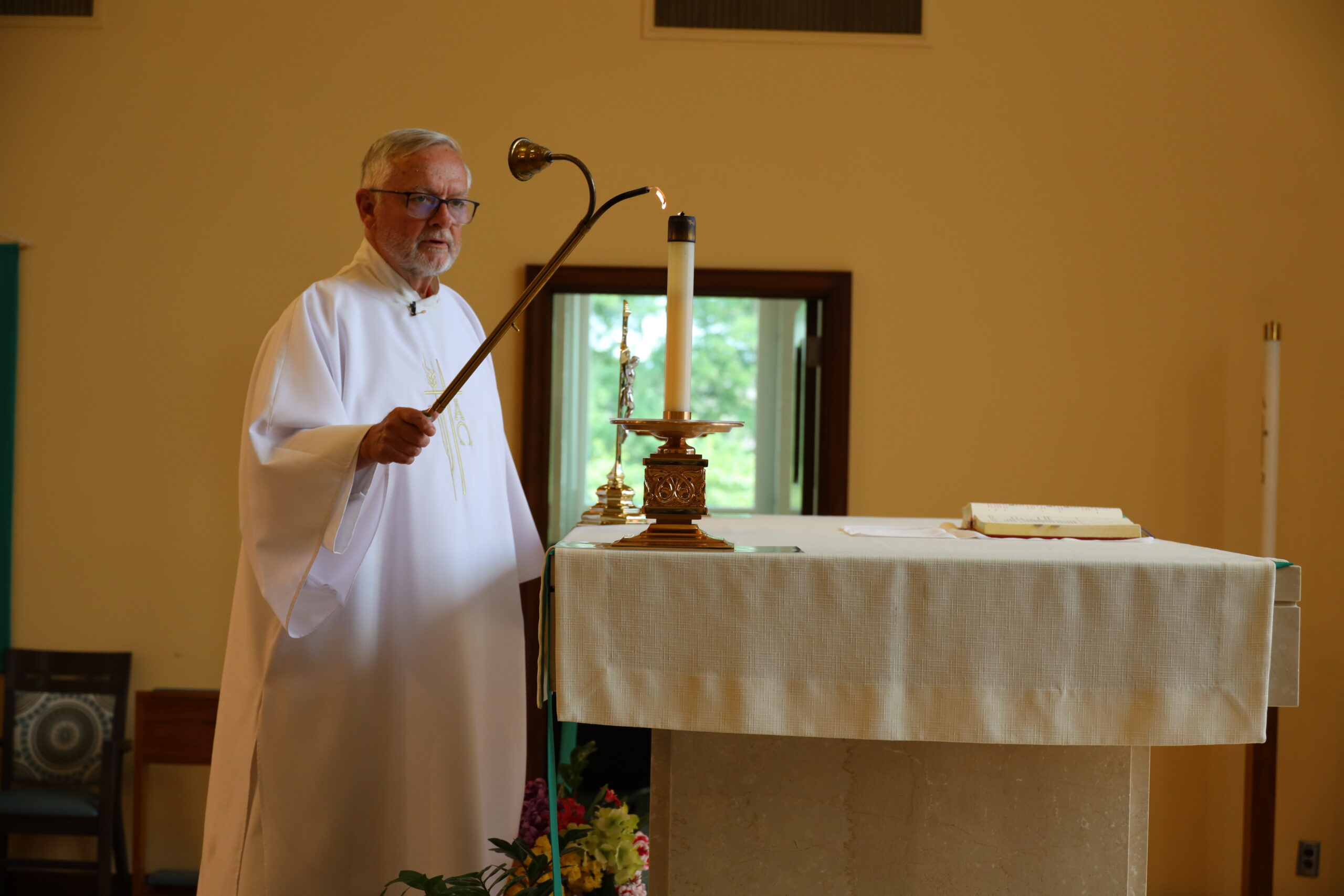
Deacon George Butterfield prepares the altar for a weekday Mass in the chapel at New Cassel Retirement Center. AMY WEINDEL/STAFF
Along with his fellow deacons, priests and approximately 4,000 EMHCs throughout the Archdiocese of Omaha, Deacon Butterfield brings the Body of Christ to those unable to attend Mass. He also visits the sick and homebound, tending to their physical and spiritual needs and listening to their unique stories. On any given day, you will find Deacon Butterfield singing hymns with residents or leading a Bible study.
At New Cassel, Deacon Butterfield arranges for priests to hear Confessions, celebrate Mass and administer the Sacrament of the Anointing of the Sick to residents. He believes access to the sacraments keeps those he ministers to joyful, whatever their physical or mental limitations.
“The elderly are strong and have a keen understanding of what is most important in life: Jesus Christ in the Eucharist,” he said. “I don’t see the need for fluffy stuff to make them feel better. These are people who come to Mass every day and receive the sacraments. Being afraid of death? That doesn’t even register with them.”
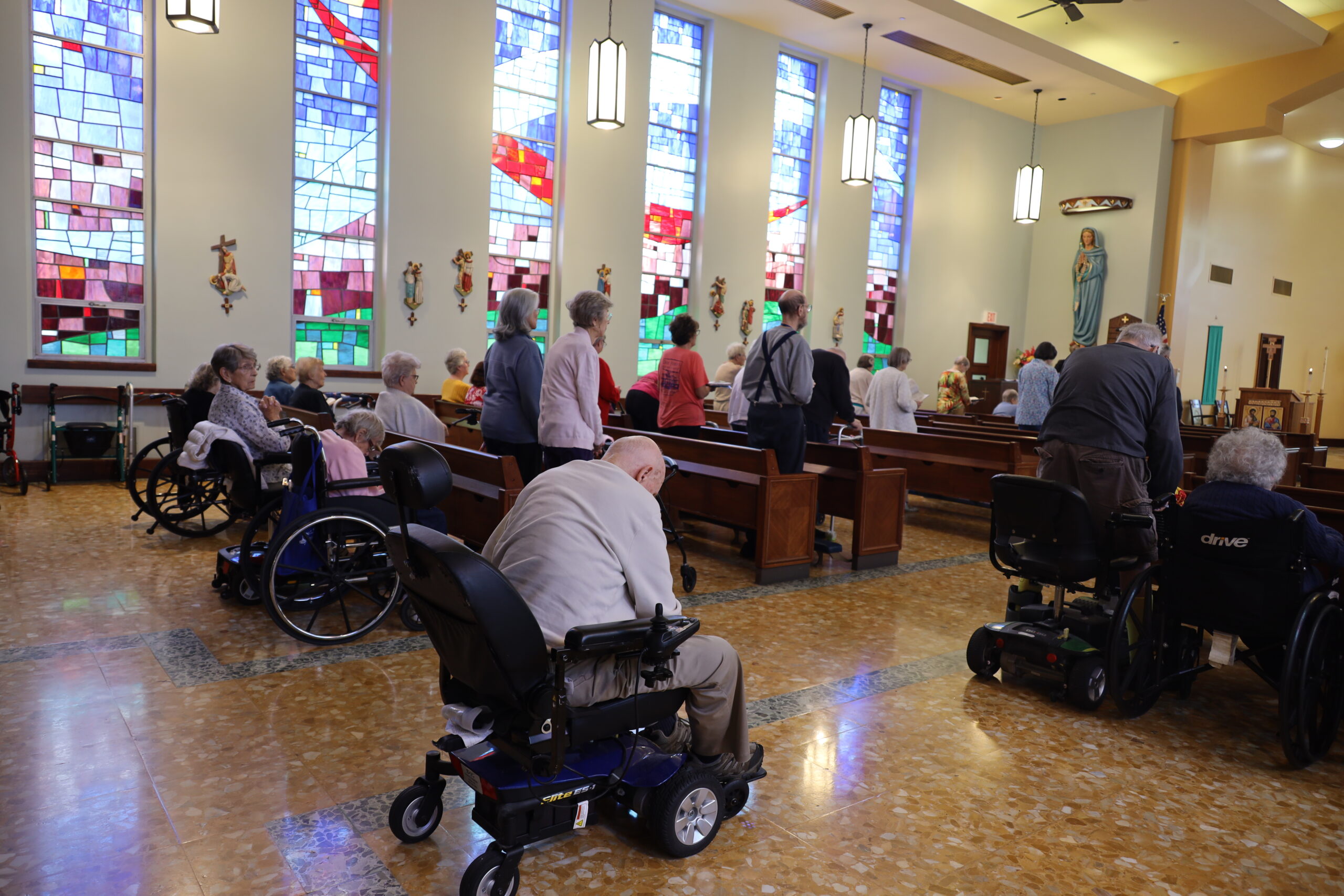
Residents of New Cassel Retirement Center attend weekday Mass. AMY WEINDEL/STAFF
For the homebound and those in hospitals and nursing homes who aren’t able to attend Mass, they can watch the weekly Mass for the Shut-ins. The Mass is broadcast each Sunday morning on WOWT-TV. Approximately 10,000 viewers tune in each week. Still more watch the Mass on the Archdiocese of Omaha website.
For many elderly people, a visit from a priest, deacon or EMHC is their only chance to talk with someone face-to-face and nourish their bodies and souls. Family rifts, distance or outliving other family members have left many alone.
THE WORDS OF THE LORD
Bob Pleiss died on Aug. 1, but his wife and children are consoled by the fact that he was well prepared. Along with Father Sohm, his parish priests visited him and gave him the Anointing of the Sick.
Although Pleiss is grieving the loss of her husband, she cherishes Father Sohm’s visit that day in the hospital.
“Father Andy was lively, personable and spirit-filled and just what Bob and I needed at that time,” she said.
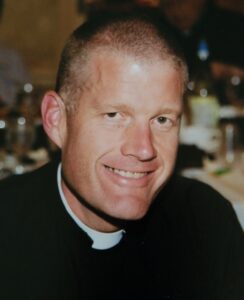
Father Andrew Sohm COURTESY PHOTO
For his part, Father Sohm considers it a gift and a blessing to be with the dying and their loved ones, but he doesn’t take credit for the comfort he brings. The words he says “are not my words. They are the words of the Lord that bring so much comfort.”
One day, when Father Sohm was only 10 years old, he asked his beloved grandmother what she was thinking. She told him that she was hoping for a happy death. At that age, he said he didn’t want to think about his grandmother dying, so he quickly changed the subject. Regardless, he was always curious about what she meant by a happy death.
Now he knows that “a happy death means to die in a state of grace,” he said. Three months after being ordained a priest, Father Sohm imparted the Apostolic Pardon on his grandmother and provided her with the happy death she had hoped for.
“There’s nothing more important than the Apostolic Pardon,” he said. “I don’t know if it came from my grandma, her story, but if the phone goes off and somebody’s sick – especially if it’s an emergency – I’m going to be there.”
By the authority which the Apostolic See has given me,
I grant you a full pardon and the remission of all your sins
in the name of the Father, and of the Son, and of the Holy Spirit.
– The Apostolic Pardon
READ MORE FROM THE CATHOLIC VOICE: